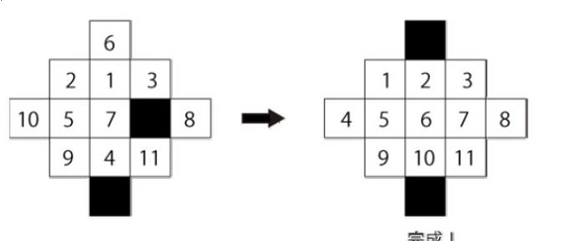Eleven puzzle
Time Limit: 20000/5000 MS (Java/Others) Memory Limit: 32768/32768 K (Java/Others)Total Submission(s): 616 Accepted Submission(s): 160
Problem Description
Partychen invents a new game named “Eleven Puzzle” .Just like the classic game “Eight Puzzle”,but there some difference between them:The shape of the board is different and there are two empty tiles.

The tile in black means it’s empty
Each step you can move only one tile.
Here comes the problem.How many steps at least it required to done the game.

The tile in black means it’s empty
Each step you can move only one tile.
Here comes the problem.How many steps at least it required to done the game.
Input
The first line of input contains one integer specifying the number of test cases to follow.
Every case contains five lines to describe the initial status of the board. 0 means empty.
It’s confirmed that the board is legal.
Every case contains five lines to describe the initial status of the board. 0 means empty.
It’s confirmed that the board is legal.
Output
Output one line for each testcase.Contain an integer denotes the minimum step(s) it need to complete the game.Or “No solution!” if it’s impossible to complete the game within 20 steps.
Sample Input
3 2 1 0 3 4 5 6 7 8 9 0 11 10 0 1 2 3 4 5 6 7 8 9 10 11 0 0 11 10 9 8 7 6 5 4 3 2 1 0
Sample Output
2 0 No solution!
Source
Recommend
lcy
题意:
搜索题。双向bfs,求出起点状态到终点的最小步数。
思路:
双向bfs,每次拓展节点时,从两个空块开始拓展,然后使用一个long long数记录一下当前的状态。
#include<cstring>
#include<string>
#include<iostream>
#include<queue>
#include<cstdio>
#include<algorithm>
#include<map>
#include<cstdlib>
#include<cmath>
#include<vector>
//#pragmp comment(linker, "/STACK:1024000000,1024000000");
using namespace std;
#define INF 0x3f3f3f3f
long long d[30];
int g[5][5];
struct node
{
int g[5][5];
int step;
int x1,y1;
int x2,y2;
} p;
map<long long,int >mp[2];
queue<node>que;
int dir[][5]= {{0,1},{0,-1},{1,0},{-1,0}};
typedef long long ll;
ll has(int a[][5])
{
ll sum=0;
for(int i=0; i<5; i++)
{
for(int j=0; j<5; j++)
{
if(a[i][j]==0x3f3f3f3f)
continue;
else
{
if(a[i][j]/10)
sum=sum*100+a[i][j];
else
sum=sum*10+a[i][j];
}
}
}
return sum;
}
inline bool ok(int x1,int y1,node k)
{
if(x1<0||x1>=5||y1<0||y1>=5)
return 0;
if(k.g[x1][y1]==12||k.g[x1][y1]==0x3f3f3f3f)
return 0;
else
return 1;
}
bool inbound(node k,int x,int y)
{
if(x>=0&&x<5&&y>=0&&y<5)
{
if(k.g[x][y]==INF||k.g[x][y]==12) return false;
else return true;
return false;
}
return false;
}
int dx[]= {0,0,-1,1};
int dy[]= {1,-1,0,0};
void bfs(int flag)
{
// mp[flag].clear();
// while(!que.empty())
// que.pop();
// mp[flag][has(p.g)]=1;
// //printf("has:%lld\n",has(p.g));
// que.push(p);
mp[flag].clear();
node k;
while(!que.empty()) que.pop();
que.push(p);
mp[flag][has(p.g)]=1;
while(!que.empty())
{
k=que.front();
que.pop();
long long pri=has(k.g);
if(flag)
{
if(mp[0][pri])
{
if(k.step+mp[0][pri]-2<=20)
{
printf("%d\n",k.step+mp[0][pri]-2);
return ;
}
else
continue;
}
}
for(int i=0; i<4; i++)
{
node ne=k;
int x,y;
x=ne.x1=k.x1+dx[i];
y=ne.y1=k.y1+dy[i];
//printf("x1:%d y1:%d x:%d y:%d\n",k.x1,k.y1,x,y);
if(ok(x,y,k)) //!!!!!!!!!!!!!!!!!!!
{ne.step++;
if(flag==0&&ne.step>13)
continue;
if(flag&&ne.step>11)
continue;
swap(ne.g[ne.x1][ne.y1],ne.g[k.x1][k.y1]);
ll ha=has(ne.g);
if(mp[flag][ha])
continue;
mp[flag][ha]=ne.step;
ne.x1=x;
ne.y1=y;
que.push(ne);
}
}
// for(int i=0; i<4; i++)
// {
// node ne=k;
// int x,y;
// x=ne.x1=k.x1+dir[i][0];
// y=ne.y1=k.y1+dir[i][1];
// //printf("x1:%d y1:%d x:%d y:%d\n",k.x1,k.y1,x,y);
// if(!ok(x,y,k))
// continue;
//
// ne.step++;
// if(flag==0&&ne.step>13)
// continue;
// if(flag&&ne.step>11)
// continue;
// swap(ne.g[x][y],ne.g[k.x1][k.y1]);
// ll ha=has(ne.g);
// if(mp[flag][ha])
// continue;
// mp[flag][ha]=ne.step;
// ne.x1=x;
// ne.y1=y;
// que.push(ne);
// }
for(int i=0; i<4; i++)
{
int x,y;
x=k.x2+dx[i];
y=k.y2+dy[i];
if(ok(x,y,k))
// continue;
{node ne=k;
ne.step++;
swap(ne.g[x][y],ne.g[k.x2][k.y2]);
if(flag&&ne.step>10)
continue;
if(!flag&&ne.step>12)
continue;
ll tmp=has(ne.g);
if(mp[flag][tmp])
continue;
ne.x2=x;
ne.y2=y;
mp[flag][tmp]=ne.step;
que.push(ne);
}
}
}
if(flag)
puts("No solution!");
}
void bfsx(int flag)
{
mp[flag].clear();
node k;
while(!que.empty()) que.pop();
que.push(p);
mp[flag][has(p.g)]=1;
while(!que.empty())
{
k=que.front();
que.pop();
long long pri=has(k.g);
if(flag)
{
if(mp[0][pri])
{
if(k.step+mp[0][pri]-2<=20)
{
printf("%d\n",k.step+mp[0][pri]-2);
return ;
}
else
continue;
}
}
for(int i=0; i<4; i++)
{
node ne=k;
int x,y;
x=ne.x1=k.x1+dir[i][0];
y=ne.y1=k.y1+dir[i][1];
//printf("x1:%d y1:%d x:%d y:%d\n",k.x1,k.y1,x,y);
if(!ok(x,y,k))
continue;
// puts("okkkk");
ne.step++;
if(flag==0&&ne.step>13)
continue;
if(flag&&ne.step>11)
continue;
swap(ne.g[x][y],ne.g[k.x1][k.y1]);
ll ha=has(ne.g);
if(mp[flag][ha])
continue;
mp[flag][ha]=ne.step;
ne.x1=x;
ne.y1=y;
que.push(ne);
}
for(int i=0; i<4; i++)
{
int x,y;
x=k.x2+dir[i][0];
y=k.y2+dir[i][1];
if(!ok(x,y,k))
continue;
node ne=k;
ne.step++;
if(flag&&ne.step>11)
continue;
if(!flag&&ne.step>13)
continue;
swap(ne.g[x][y],ne.g[k.x2][k.y2]);
ll tmp=has(ne.g);
if(mp[flag][tmp])
continue;
ne.x2=x;
ne.y2=y;
mp[flag][tmp]=ne.step;
que.push(ne);
}
}
if(flag) printf("No solution!\n");
}
int main()
{
memset(p.g,0x3f3f3f3f,sizeof p.g);
p.g[0][2]=12;
p.g[1][1]=1;
p.g[1][2]=2;
p.g[1][3]=3;
p.g[2][0]=4;
p.g[2][1]=5;
p.g[2][2]=6;
p.g[2][3]=7;
p.g[2][4]=8;
p.g[3][1]=9;
p.g[3][2]=10;
p.g[3][3]=11;
p.g[4][2]=12;
p.x1=0;
p.y1=2;
p.x2=4;
p.y2=2;
p.step=1;
bfs(0);
int T;
scanf("%d",&T);
while(T--)
{
memset(p.g,0x3f3f3f3f,sizeof p.g);
p.step=1;
int swi=0;
for(int i=0; i<5; i++)
{
if(i==0||i==4)
{
scanf("%d",&p.g[i][2]);
int j=2;
if(p.g[i][j]==0)
{
p.g[i][j]=12;
if(swi)
{
p.x1=i;
p.y1=j;
}
else
{
p.x2=i;
p.y2=j;
}
swi=1;
}
}
else if(i==1||i==3)
for(int j=1; j<=3; j++)
{
scanf("%d",&p.g[i][j]);
if(p.g[i][j]==0)
{
p.g[i][j]=12;
if(swi)
{
p.x1=i;
p.y1=j;
}
else
{
p.x2=i;
p.y2=j;
}
swi=1;
}
}
else
for(int j=0; j<5; j++)
{
scanf("%d",&p.g[i][j]);
if(p.g[i][j]==0)
{
p.g[i][j]=12;
if(swi)
{
p.x1=i;
p.y1=j;
}
else
{
p.x2=i;
p.y2=j;
}
swi=1;
}
}
}
bfs(1);
}
return 0;
}
























 被折叠的 条评论
为什么被折叠?
被折叠的 条评论
为什么被折叠?








